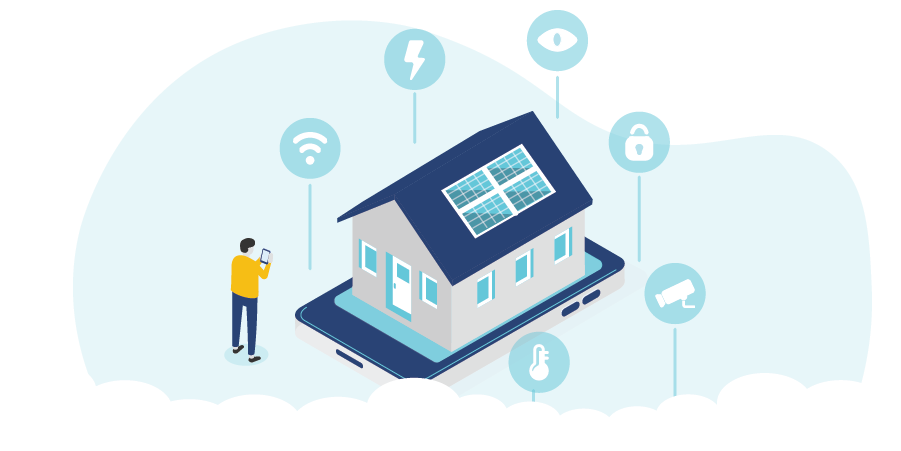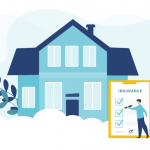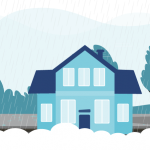Here’s How You Can Protect Your Home (and Your Savings) with Smart Home Technology
October 11, 2019
Echo, Nest, Ecobee, Alexa, Google Home—it seems like smart home tech is everywhere. But the real question is: what do all these upgrades mean for your insurance? And more importantly, what do they mean for your wallet?
While investing in a smart home won’t come cheap, it’ll save you big bucks on your annual expenses.

A Smart Home is a Safe Home
A smart home uses a network to automate or control elements within a home according to the user’s needs. Devices can be integrated locally, through a central console like a wall mount, or digitally with cloud-based software and Wifi or Bluetooth. Smart Home products typically fall into three categories:
Home Upgrades
Smart lighting, thermostats, air conditioning, window coverings, and home appliances.
Sensors and Prevention Devices
Flood monitors, leak sensors, and smoke and carbon dioxide detectors.
Security Features
Video cameras, smart door and garage locks, silent alarms, motion sensors, and speakers.
Home Upgrades
Smart lighting, thermostats, air conditioning, window coverings, and home appliances.
Sensors and Prevention Devices
Flood monitors, leak sensors, and smoke and carbon dioxide detectors.
Security Features
Video cameras, smart door and garage locks, silent alarms, motion sensors, and speakers.
Since most systems can be accessed through a mobile app, smart home products offer safety and convenience from the palm of your hand. You can monitor or adjust settings remotely to track your home’s temperature, pre-program lights to power up when you’re home, or turn off your main water supply. Whether it’s a leaky pipe or a burglar, sensors can alert you to danger and allow you to take immediate action even if you’re not at home. You’ll be protecting your home AND saving potentially thousands of dollars in damages and utility costs.
And that’s just the tip of the iceberg. Smart homes are a great way to accommodate special needs for aging individuals or anyone living with a disability or chronic illness. Being able to go hands- or voice-free altogether can allow for a much safer, more comfortable (and maybe even longer) independent living experience than traditional home accessibility.
Home automation also encourages sustainable living. By tracking and conserving your water, electricity, and energy usage, you’re also saving power, effortlessly and efficiently reducing your home’s environmental impact.
Smart Home, Smart Savings
Another perk? The insurance savings. With smart home technology, you might be eligible for discounts or rebates from select insurance providers. The total discount offered ultimately depends on your property, location, and exposures, but it’s worth reaching out to your broker if it helps alleviate the overall cost of upgrading. And since you’re going that extra mile to protect your home investment, insurers might be more willing to offer incentive programs if you install certain features (like a security system or a fire alarm).
Even if you don’t get a discount, you’ll still be able to save on insurance with a smart home. How? It’s simple: a smart home means fewer chances of risk occurring. Whether it’s by deterring intruders or avoiding (or limiting) water damage, the sooner you know, the sooner you can fix a problem before it turns into a claim. And fewer claims mean a lower premium over time.
Can I get hacked through a smart home system?
Although cyberattacks on smart home systems are relatively uncommon, there’s always potential for a breach when using cloud-based software. Be sure to research what system works best for your household and customize privacy settings on all devices to your needs. We’ve listed some sites below just to get you started:
- Best Smart Home Devices 2019: Get Comfy with Smart Lighting, Heating, and More
- Best Smart Home Systems for a Connected Domicile
- The Best Smart Home Devices of 2019
Plus, in the unlikely event of a hack, your Homeowner’s policy should cover you for expenses related to a cyber breach and online fraud (but check with your provider just to be sure). And if you want extra protection, you can always look into endorsements for Identity Theft Insurance.
The more you know, the more you can save. But your home isn’t just an asset—it’s your safe space and investing in smart home technology today will get you the protection you need tomorrow. And to do that, you’ll need a broker that understands your risks. At PROLINK—Canada’s Insurance Connection, we’ll make sure that your smart home comes with a smart insurance plan.
PROLINK’s blog posts are general in nature. They do not take into account your personal objectives or financial situation and are not a substitute for professional advice. The specific terms of your policy will always apply. We bear no responsibility for the accuracy, legality, or timeliness of any external content.




